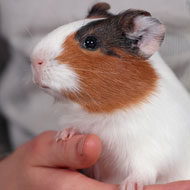Guinea pigs linked to Strep infection

Lab testing indicates the two human cases of Streptococcal infection were linked to guinea pig exposure.
A new report suggests guinea pigs are a potential source of the serious infection, Streptococcus equi sub species zooepidemicus.
S. zooepidemicus is rarely transmitted from animals to humans. It is most commonly associated with drinking un-pasteurised milk or through contact between infected horses and people with underlying health problems.
However, a recent report published in the Emerging Infectious Disease journal describes the case of two patients who became infected after contact with guinea pigs. Further investigations suggest both patients and two of the three guinea pigs tested were infected with S. zooepidemicus.
Patient one was an adult male from Northern Virginia who arrived in hospital with influenza-like symptoms including worsening bilateral thigh pain and stiffness, shivering, nausea, fatigue, headache and diarrhoea. Blood cultures confirmed group C streptococcal infection and wound cultures identified S. equi.
While a subspecies was not identified, zooepidemicus was suspected as it is the only subspecies of S. equi that is zoonotic.
The second patient was an elderly man from Central Virginia, who is a relative of patient one. He was admitted to hospital a week after patient one and, again, blood cultures confirmed group C Streptococcus spp.
Shortly before being admitted to hospital, patient one had bought four guinea pigs, one of which had died soon after purchase. Patient two had cleaned their enclosure two days prior to his illness.
A relative who was caring for the animals relinquished them to the Virginia Department of Agriculture for euthanasia and testing. Laboratory staff confirmed S. zooepidemicus in isolates collected from two of the three guinea pigs.
In conclusion, researchers say S. zooepidemicus should be considered when a patient has purulent wounds or systemic symptoms of infection, as well as known contact with guinea pigs or their environment. In addition, patients with S. equi should be questioned about their exposure to guinea pigs and other animals.
For the full report visit: http://wwwnc.cdc.gov/eid/article/21/1/14-0640_article



 The latest
The latest